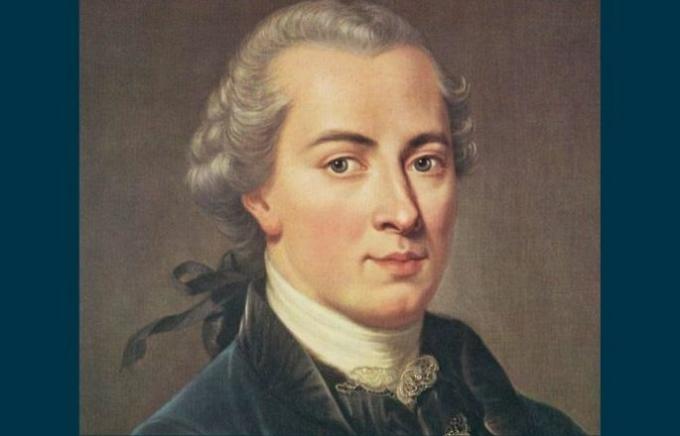Immanuel Kant he is one of the most studied philosophers in modernity.
His works are a pillar and starting point for the modern german philosophy, with followers such as Fichte, Hegel, Schelling and Schopenhauer.
Kant tried to resolve the issues between the rationalism of Descartes and Leibniz and the empiricism of philosophers David Hume and John Locke.
Kant's Life and Work
Immanuel Kant was born in Königsberg, East Prussia, on April 22, 1724.
He was the fourth of nine children of the couple Johann Georg Kant, a maker of horse harnesses, and Anna Regina Kant.
He lived a modest life and devoted to Lutheranism. He studied at the "College Fredericianum" before going to the "University of Königsberg".
So, after spending his teenage years studying at a Protestant college, he went to the University of Königsberg in 1740.
There, he would be associate lecturer and associate lecturer only in 1755, when he obtained a doctorate in philosophy, also studying physics and mathematics, in addition to teaching Natural Sciences.

In 1770 he took up the Chair of Logic and Metaphysics at the University of Königsberg. At this point, the so-called Kantian pre-critical phase ends, in which dogmatic philosophy predominates.
His most emblematic texts from that time were “The Universal History of Nature" and "heaven theory”, from 1775.
In the author's second phase, the “dogmatic lethargy” is overcome based on the shock suffered by reading the philosopher's writings. David Hume (1711-1776). At this stage, Kant will write “The Critique of Pure Reason” (1781) and “Critique of Practical Reason” (1788).
Furthermore, he was a contemporary of American Independence and the French Revolution, having personally seen Napoleon Bonaparte conquer Prussia.
Kant, a methodical man and in poor health, was a professor of Physics, Anthropology, Geography, Logic, Metaphysics, etc. In addition, he wrote some essays on history and politics.
He died at the age of 80 in Königsberg on February 12, 1804.
Curiosities
- Kant did nothing famous until he was 50 years old, when his second phase begins, in which he produced frantically.
- Immanuel Kant was methodical, systematic and punctual. At precisely 3:30 pm, he would go out for a walk, this being an event to regulate clocks in the city.
Kant's Main Ideas
Kant reveals that the spirit or reason, shapes and coordinates the sensations, of which the impressions of the external senses are only raw material for knowledge.
Aesthetic and teleological judgment unites our moral and empirical judgments so as to unify their system.
It is worth mentioning that Kant was an enthusiast of Enlightenment European and American, where he published the work "What is the Enlightenment?" (1784).

In this work, he synthesizes the possibility of man following his own reason, which would be, at the same time, man's exit from his minority.
This is defined as man's inability to make use of his own understanding.
That is, the fact of not daring to think, for reasons of cowardice and laziness, the main reasons for human being underage.
The "Kantian Critique" and "The Judgments"
At work "Critique of pure reason" (1781), Kant seeks to formulate ways for us to make good use of understanding.
When realizing that we are limited by what we are given to know, we cannot know the truths about the world “as it is in itself”. This is because we perceive and think about the world in certain ways.
Thus, it is important to study how knowledge can be limited, as this leads to its real possibilities and applications.

Already in "Critique of practical reason" (1788), Kant formulates the foundations of his moral philosophy. What founds human action and what we are allowed to do, thus constitute a treatise on human morality.
In this work, the author unveils morality in a similar way to how he formulates his approach to knowledge. He discusses the principles of moral action as a way of separating morality from a religious foundation.
For him, reason was sufficiently capable of solving questions concerning morality, without needing the appeal to superstition or supernatural elements. In this, develop your categorical imperative, a rational formula for resolving moral issues.
Therefore, Kant formulates the "synthetic judgment" to deal with experimentation as a guarantee of true knowledge. According to him, the truth cannot be reached just by analyzing its propositions.
Already the "analytical judgment", on the other hand, is founded on the principle of identity. In it, the predicate points to an attribute contained in the subject and, when the subject is denied, the predicate is denied (vice versa).
O "aesthetic judgment", in turn, would only be possible for those with the faculty to judge. These would be the only ones capable of a critical investigation into the concept of "beautiful".
Kant's Phrases

- “Man's ultimate mission is to know what it takes to be a man.”
- "Two things that fill my soul with growing admiration and respect: the starry sky above me and the moral law within me."
- “The sage can change his mind. the ignorant, never.”
- “We are not rich for what we have, but for what we don't need to have.”
- “Science is organized knowledge. Wisdom is organized life.”
- “Judgment in general is the faculty of thinking the particular as understood under the universal.”
- “Happiness is the state in the world of a reasonable being, to whom, throughout the course of his existence, everything happens according to his aspiration and his will..”
Read more about some related topics:
- The most important philosophers in history
- modern philosophy
- Max Weber
- discards
- Edmund Husserl's Phenomenology
